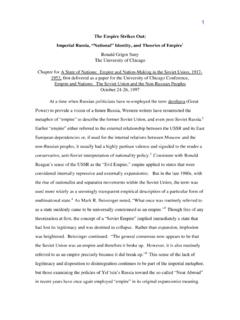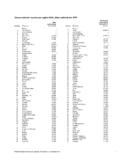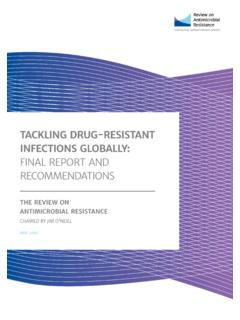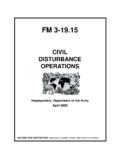Transcription of UNICEF/UNDP/World Bank/WHO Special …
1 UNICEF/UNDP/World Bank /WHOS pecial Programme for Research and Training in Tropical Diseases (TDR) UNICEF/UNDP/World Bank /WHOS pecial Programme for Research and Training in Tropical Diseases(TDR)HANDBOOKNON-CLINICALSAFETYT ESTINGThis Handbook on Non-clinical Safety Testing is designed to serve as an aid for scientists who wish to undertake non-clinical safety testing for regulatory purposesduring product development. It has been developed as part of a significant and wide-ranging technology transfer and capacity building programme in the area of pre-clin-ical product development for disease endemic Non-clinical Safety Testing Handbook was produced by a Scientific WorkingGroup (SWG) on pre-clinical issues, convened by the UNICEF/UNDP/World Bank/WHOS pecial Programme for Research & Training in Tropical Diseases (TDR) and consistingof independent scientific specialists from around the world.
2 The Handbook is broadlybased on current safety testing guidelines including those of the Organisation for Eco-nomic Cooperation and Development (OECD) and the International Conference onHarmonisation (ICH). The Handbook will provide scientists and laboratories in disease endemic countrieswith the necessary technical aid for planning and implementing non-clinical safetytesting programmes. The Handbook attempts to highlight the differences between syn-thetic chemical drug, vaccine and traditional herbal (botanical) medicine gratefully acknowledges the participation and support of all those involved inthe production of this Handbook. For all correspondence:Dr Deborah KioyPre-clinical CoordinatorProduct Research and DevelopmentTDR/WHOA venue Appia 201211 Geneva 27 SwitzerlandTel: +41 22 791 3524 Fax: +41 22 791 4854E-mail: OF CONTENTSFOREWORD.
3 11. INTRODUCTION .. General Remarks.. Scope.. Objectives.. 102. CONSIDERATIONS IN THE NON-CLINICAL DEVELOPMENT OF PHARMACEUTICALS.. Regulatory Aspects of Pharmaceutical Development and Submissions.. Methodological Aspects of Safety Testing.. Selection of test system.. Conditions for test systems.. Size of the experiment.. Selection of doses and concentrations.. Monitoring of exposure and reversibility of effects.. Test item characterization.. Good Laboratory Practice.. Legal Aspects in Pharmaceutical Development.. 233. NON-CLINICAL SAFETY TESTING STRATEGY.. General Issues.. The General Design of Non-clinical Safety (Toxicity) Testing Programmes for Pharmaceuticals in International Guidelines.
4 Single dose acute toxicity studies.. Repeated dose toxicity studies.. Reproductive toxicity studies.. Genotoxicity studies.. Carcinogenicity studies.. Concluding remarks.. General Guidance to a Full Non-clinical Safety Testing Programme.. Before phase I.. Safety information to support phase I.. Safety information to support phase II.. Safety information to support phase III.. Safety information to support product label.. Additional non-clinical safety information that may be required.. Specific Aspects of Different Groups of Pharmaceuticals.. Synthetic chemical compounds.. Traditional and herbal medicines.. Toxicology safety testing for vaccines.
5 424. REFERENCES.. 475. GLOSSARY OF TERMS.. 516. INFORMATION ON OFFICIAL REQUIREMENTS .. 55 Appendix common technical document: safety (condensed version).. 61 Appendix guideline M3 (condensed version).. 77 Appendix The rules governing medicinal products in the European Union (condensed version).. 89 Appendix guidelines for the testing of chemicals (table of contents of part 4: health effects) .. 91 Appendix toxicological principles for the safety of food ingredients (Redbook 2000).. 95 Appendix draft guidance for industry "botanical drug products" (condensed version).. 101 Appendix note for guidance on vaccines.. 1151 FOREWORDOne of the most important milestones in product development is the decision to enterinto clinical trials with a candidate product.
6 This important decision is based, in part,on data produced during non-clinical safety testing of the candidate during thepreclinical phases of development. The quality and reproducibility of safety data arehereby key components of their utility for supporting the assumption of safety inhumans. Therefore, when the non-clinical programme in TDR was started four yearsago, Good Laboratory Practice (GLP) was viewed as an important starting point. TheGLP activities have progressed quite successfully, and documents have been developedfor use in training and upgrading of laboratories to GLP , 2, 3, 4 However, GLP is amanagerialtool concerned with the way non-clinical studies are planned, performed,monitored, recorded, reported and archived, and it is not concerned with the questionabout why the study is being conducted ( is it justified?)
7 Will it achieve the results?).The scientificissues of why the study is being conducted are as equally important as thetechnical, quality issues if a successful and internationally acceptable non-clinical data package for submission of a product for registration and marketing permits is tobe achieved. It was therefore considered important to equip our target countries, thedisease endemic countries (DECs), with a sound blueprint for developing non-clinicaltesting programmes that takes into consideration both the scientific and the technical,quality aspects of the studies. Especially important is a system for decision-making andplanning of non-clinical activities.
8 The need for this technical guidance was expressed during the first ScientificWorking Group (SWG) meeting on GLP issues, held at WHO, Geneva, in 1999, whenparticipants from the DECs indicated an immediate need for a glossary for valid models1 Quality standards in basic biomedical research. Draft handbook. Geneva, UNDP/World Bank/WHO SpecialProgramme for Research and Training in Tropical Diseases, 2001 (document no. TDR/PRD/ ).2 Good Laboratory Practice (GLP). Handbook. Geneva, UNDP/World Bank/WHO Special Programme forResearch and Training in Tropical Diseases, 2001 (document no. TDR/PRD/ TDR).3 Good Laboratory Practice (GLP). Training manual for the trainer.
9 Geneva, UNDP/World Bank/WHO SpecialProgramme for Research and Training in Tropical Diseases, 2001 (document no. TDR/PRD/ TDR). 4 Good Laboratory Practice (GLP). Training manual for the trainee. Geneva, UNDP/World Bank/WHO SpecialProgramme for Research and Training in Tropical Diseases, 2001 (document no. TDR/PRD/ ).and a listing of appropriate tests. During the various TDR-sponsored GLP trainingworkshops to introduce the concepts of GLP to scientists in DECs (1999-2002), scien-tists also expressed the need for guidance on how to plan a non-clinical safety testing programme. This demonstrated that, although the technical knowledge is available inthese countries, there is an apparent need for guidance on appropriate tests that are nec-essary to support registration of a product.
10 While guidance on technical requirementsfor non-clinical development does exist in many organizations ( US Food and DrugAdministration [FDA] Redbook; European Union, Committee on Proprietary Medic-inal Products [CPMP] Notice to Applicants; International Conference on Harmonisa-tion of Technical Requirements [ICH] Common Technical Document and specificSafety Testing Guidelines; Organisation for Economic Co-operation and Development[OECD] Guidelines for Testing of Chemicals, Part 4), such guidance might not be easilyaccessible to scientists in DECs. Furthermore, while it is true that product developmentshould be evaluated on a case-by-case basis, a general list of tests would be useful forDECs and would provide the required glossary.

















